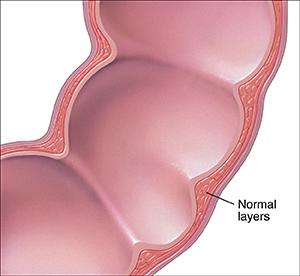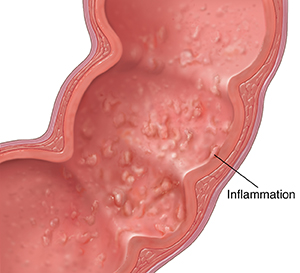Your Child Has Ulcerative Colitis
Ulcerative colitis is a type of inflammatory bowel disease (IBD). It affects your child’s large intestine (colon) and rectum. The rectum is where stool is stored before leaving the body. Ulcerative colitis causes swelling, inflammation, bleeding, and sometimes sores in this part of the digestive tract. The cause of ulcerative colitis is not fully understood. But it's related to a defect in the immune system. The defect causes inflammation of the digestive tract. Genes or family history also may set off this condition.


What are the symptoms of ulcerative colitis?
Common symptoms of ulcerative colitis include:
-
Diarrhea
-
Blood and pus in the stool, or rectal bleeding
-
Feeling of incomplete bowel movement with diarrhea
-
Sudden feeling that a bowel movement must happen right away (urgency) with diarrhea
-
Belly pain and cramping
-
Tiredness (fatigue)
-
Weight loss
-
Poor appetite
-
Fever
-
Joint problems
-
Rash or skin changes
-
Sores (ulcers) in the colon
How is ulcerative colitis diagnosed?
The healthcare provider will start by examining your child and asking some questions. The provider may want to do certain tests, such as:
-
Blood and stool tests
-
CT scan or MRI. These are imaging tests that take detailed pictures from outside your child’s body.
-
Lower GI (gastrointestinal) series. A type of X-ray test that takes pictures of your child’s colon and rectum.
-
Colonoscopy and sometimes endoscopy. Tests during which a flexible tube with a camera is used to view the inside of your child’s digestive tract. This lets the healthcare provider take a tiny tissue sample (biopsy) and look at the GI tract lining.
-
Wireless capsule endoscopy. This wireless camera is swallowed like a pill and takes pictures of the inside of the intestine. It comes out in the stool with a bowel movement. Pictures are uploaded to a computer to be assessed. Your healthcare provider may order this test to see if the small intestine is involved in your child's inflammatory bowel disease.
How is ulcerative colitis treated?
There are ways to help your child feel better and manage symptoms. These include:
-
Medicines that control swelling and bleeding. These medicines may be given by mouth, into the rectum, as an injection, or through an IV as an infusion.
-
Surgery to remove the affected intestine. This may cure the condition. The healthcare provider will talk to you about this if it's a choice for your child.
Following up with the healthcare provider
Once symptoms are under control (or “quiet”), the healthcare provider will want to see your child 2 to 3 times a year for follow-up. Tests may be done, including:
It's important to make sure your child is up-to-date on all vaccines.
Handling flare-ups
Flare-ups are times when your child feels symptoms. These may still happen. These tips can help you and your child deal with flare-ups:
-
Allow more time for your child to get ready in the morning. During a flare-up, your child may need longer bathroom time. Stress and pressure can make symptoms worse. Make sure your child has plenty of time and doesn’t feel rushed.
-
Talk with your child’s teachers and school officials about your child’s ulcerative colitis. Talk with your child’s teachers about flare-ups. Ask them to let your child use the bathroom as needed. This can help prevent accidents. Children with ulcerative colitis may miss school more often during flare-ups. Work with your child’s teachers to help your child keep up with schoolwork. Your child should qualify for accommodations under Section 504 of the Rehabilitation Act of 1973. Your healthcare provider can help you get school accommodations by writing a letter to the school.
-
Let your child be active. Having ulcerative colitis doesn’t mean your child can’t play sports or be active. During flare-ups, your child might not feel well enough to be active. Let your child decide how much activity feels OK during flare-ups. Encourage your child to be active when symptoms are quiet.
-
Encourage good nutrition. A healthy diet provides good nutrition for growth. Talk to your child about making healthy food choices when away from home.
-
Make sure your child takes all of their medicines. This can help reduce the number of flare-ups.
-
Look into ulcerative colitis support groups and resources. If your child is feeling alone or different from peers, a support group can offer tips on helping your child lead a normal, active life.
To learn more
To learn more about living well with ulcerative colitis, visit: